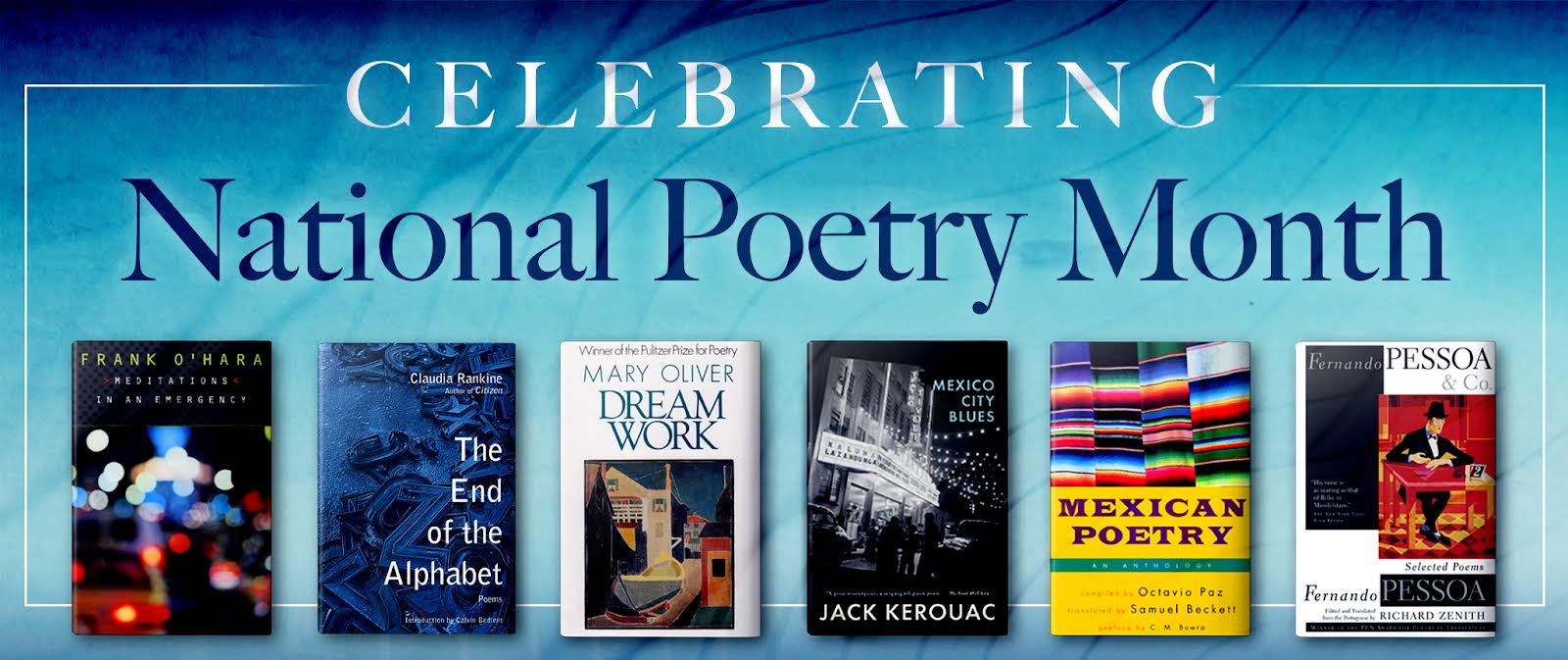News Room
- Home
- News Room
- Reading lists
- Celebrating National Poetry Month
It’s once again that time of year when poetry lovers ask: Is April really the cruelest month? Not only is spring springing all around us, but it’s National Poetry Month — a time for both re-reading favorite poems and branching out to discover new ones. This year, we’re celebrating with a list of ten poetry books we’re delighted to publish, from classics of the twentieth century to the cutting edge of innovative verse today.
 a “Working Life”, Eileen Myles
a “Working Life”, Eileen Myles
This month, we’re delighted to publish a “Working Life”, the latest from Eileen Myles, one the most prominent and admired poets working in English today, whom Natalie Diaz has called “a voice always becoming, unpinnable and queer” in the pages of the New York Times Book Review. This new collection unerringly captures the measure of life. Whether alone or in relationship, on city sidewalks or in the country, Myles’s lyrics always engage with permanence and mortality, danger and safety, fear and wonder.
Fusing the personal and the political in high-voltage verse, Amiri Baraka—“whose long illumination of the black experience in America,” as the New York Times has noted, “was called incandescent in some quarters and incendiary in others”—was one of the preeminent literary innovators of the past century. This volume comprises the fullest spectrum of his rousing, revolutionary poems, from his first collection to previously unpublished pieces composed during his final years. Selected and prefaced by Paul Vangelisti, S O S is the essential edition of Baraka’s poetic work.
When we published Kay Ryan’s new and selected poems in 2010, it promptly received the Pulitzer Prize, adding to an already incredible list of honors for the poet that included a term as US Poet Laureate, a Guggenheim Fellowship, a MacArthur Fellowship, and a Ruth Lilly Poetry Prize. The Best of It offered Ryan’s own selection of more than two hundred poems, granting both longtime followers and new readers a stunning retrospective of her earlier work as well as a generous selection of powerful poems that had not yet been published. The result was a major event in American poetry.
 Selected Poems, Pablo Neruda, translated by Ben Belitt
Selected Poems, Pablo Neruda, translated by Ben Belitt
The winner of the 1971 Nobel Prize for Literature, Pablo Neruda is widely regarded as the greatest Latin American poet of the twentieth century. This bilingual edition makes available a major selection of his poems, both in the original Spanish and impressively rendered into English by the person Robert Creeley called “his most enduring translator, the poet Ben Belitt.”
 The End of the Alphabet, Claudia Rankine
The End of the Alphabet, Claudia Rankine
These poems—intrepid, obsessive, and erotic—tell the story of a woman’s attempt to reconcile despair. Beginning near the end and then traveling back to a time before her disquiet, the poems in this vivid collection describe living despite one’s alienation from the self. Drawing on voices from Jane Eyre to Lady MacBeth, Rankine welds the cerebral and the spiritual, the sensual and the grotesque, courting paradox while defiantly establishing her place as one of the most intriguing voices in contemporary poetry.
 Mexico City Blues, Jack Kerouac
Mexico City Blues, Jack Kerouac
Originally published by Grove Press in 1959, Mexico City Blues is Kerouac’s most important verse work that incorporates all the elements of his theory of spontaneous composition. Memories, fantasies, dreams, and surrealistic free association are lyrically combined in the loose format inspired by jazz and the blues. Now featuring a striking new cover as part of Grove’s centenary reissues, and with references to William S. Burroughs, Gregory Corso, and Bill Garver, this important book in Kerouac’s oeuvre is an original and moving epic of sound, rhythm, and religion.
Dream Work is a collection of forty-five poems—including the celebrated “Wild Geese”—that follows both chronologically and logically Mary Oliver’s American Primitive, which won her the Pulitzer Prize. The depth and diversity of perceptual awareness on which Oliver’s steadfast and radiant reputation were built mark all the poems in the book, which finds the poet turning to the solitary and difficult labors of the spirit: accepting the truth about one’s personal world, and valuing the triumphs while transcending the failures of human relationships.
 Meditations in an Emergency, Frank O’Hara
Meditations in an Emergency, Frank O’Hara
Frank O’Hara was one of the great poets of the twentieth century and a crucial contributor to what Donald Allen termed the New American Poetry, “which, by its vitality alone, became the dominant force in the American poetic tradition.” This collection is a reissue of a volume first published by Grove Press in 1957, and it demonstrates beautifully the flawless rhythm underlying O’Hara’s conviction that to write poetry, indeed to live, “you just go on your nerve.”
 Mexican Poetry: An Anthology, edited by Octavio Paz, Translated by Samuel Beckett
Mexican Poetry: An Anthology, edited by Octavio Paz, Translated by Samuel Beckett
Edited and with an introduction by Octavio Paz, this anthology places thirty-five poets within a literary and historical context that spans four centuries (1521-1910). The accomplished translation is the work of the young Samuel Beckett, just out of Trinity College, who had been awarded a grant by UNESCO to collaborate with Paz on the project. The result is a major collection of Mexican poetry from its beginnings until the modern period, compiled and translated by two giants of world literature.
 Fernando Pessoa & Co., edited and translated by Richard Zenith
Fernando Pessoa & Co., edited and translated by Richard Zenith
In a newly updated and expanded edition of his celebrated 1998 Fernando Pessoa & Co., translator and biographer Richard Zenith brings together Pessoa’s most memorable poetic works. From spare minimalism to revolutionary exuberance, Fernando Pessoa & Co. showcases the seminal poet’s timeless and innovative work in all of its extraordinary depth and poetic passion.











